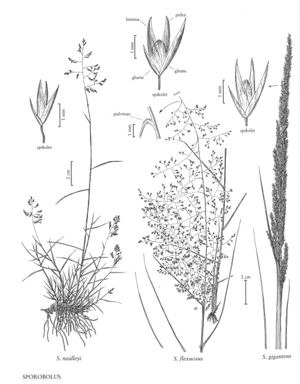Difference between revisions of "Sporobolus nealleyi"
FNA>Volume Importer |
imported>Volume Importer |
||
| (4 intermediate revisions by 2 users not shown) | |||
| Line 17: | Line 17: | ||
-->{{Treatment/Body | -->{{Treatment/Body | ||
|distribution=Maine;Colo.;N.Mex.;Tex.;Ariz.;Nev. | |distribution=Maine;Colo.;N.Mex.;Tex.;Ariz.;Nev. | ||
| − | |discussion=<p>Sporobolus nealleyi grows in sandy and gravelly soils, usually in those derived from gypsum, or near alkaline habitats associated with desert grasslands. It is known only from the southwestern United States, where it grows at 700-3000 m.</p> | + | |discussion=<p><i>Sporobolus nealleyi</i> grows in sandy and gravelly soils, usually in those derived from gypsum, or near alkaline habitats associated with desert grasslands. It is known only from the southwestern United States, where it grows at 700-3000 m.</p> |
|tables= | |tables= | ||
|references= | |references= | ||
| Line 26: | Line 26: | ||
-->{{#Taxon: | -->{{#Taxon: | ||
name=Sporobolus nealleyi | name=Sporobolus nealleyi | ||
| − | |||
|authority=Vasey | |authority=Vasey | ||
|rank=species | |rank=species | ||
| Line 33: | Line 32: | ||
|basionyms= | |basionyms= | ||
|family=Poaceae | |family=Poaceae | ||
| − | |illustrator=Linda A. Vorobik | + | |illustrator=Linda A. Vorobik;Hana Pazdírková |
| + | |illustration copyright=Utah State University | ||
|distribution=Maine;Colo.;N.Mex.;Tex.;Ariz.;Nev. | |distribution=Maine;Colo.;N.Mex.;Tex.;Ariz.;Nev. | ||
|reference=None | |reference=None | ||
| Line 39: | Line 39: | ||
|publication year= | |publication year= | ||
|special status= | |special status= | ||
| − | |source xml=https:// | + | |source xml=https://bitbucket.org/aafc-mbb/fna-data-curation/src/200273ad09963decb8fc72550212de541d86569d/coarse_grained_fna_xml/V25/V25_683.xml |
|subfamily=Poaceae subfam. Chloridoideae | |subfamily=Poaceae subfam. Chloridoideae | ||
|tribe=Poaceae tribe Cynodonteae | |tribe=Poaceae tribe Cynodonteae | ||
Latest revision as of 17:58, 11 May 2021
Plants perennial; cespitose, bases hard and knotty, not rhizomatous. Culms 10-50(60) cm tall, 0.7-1.2 mm thick. Sheaths rounded below, occasionally glabrous, usually villous to tomentose along the margins and back, with soft, kinky hairs to 4 mm; ligules 0.2-0.4 mm; blades (0.6)1.5-6(7) cm long, 1-1.5 mm wide, involute, stiff, spreading at right angles to the culm, glabrous abaxially, scabridulous adaxially, margins smooth. Panicles 3-10 cm long, (0.3)1-5(6) cm wide, longer than wide, ultimately open, subovate, lower portion often included in the uppermost sheath; lower nodes with 1-2 branches; primary branches 0.5-5 cm, appressed or spreading to 90° from the rachis; secondary branches appressed or spreading, without spikelets on the lower 1/8 – 1/4; pedicels 0.2-2 mm, appressed or spreading. Spikelets 1.4-2.1 mm, purplish. Glumes unequal, linear-lanceolate to ovate, membranous; lower glumes 0.5-1.1 mm; upper glumes 1.3-2 mm, from slightly shorter than to subequal to the florets; lemmas 1.4-2.1 mm, ovate, membranous, glabrous, acute; paleas 1.4-2.1 mm, ovate, membranous; anthers 0.7-1 mm, purplish. Fruits 0.7-1 mm, orangish to whitish. 2n = 40.
Distribution
Maine, Colo., N.Mex., Tex., Ariz., Nev.
Discussion
Sporobolus nealleyi grows in sandy and gravelly soils, usually in those derived from gypsum, or near alkaline habitats associated with desert grasslands. It is known only from the southwestern United States, where it grows at 700-3000 m.
Selected References
None.
